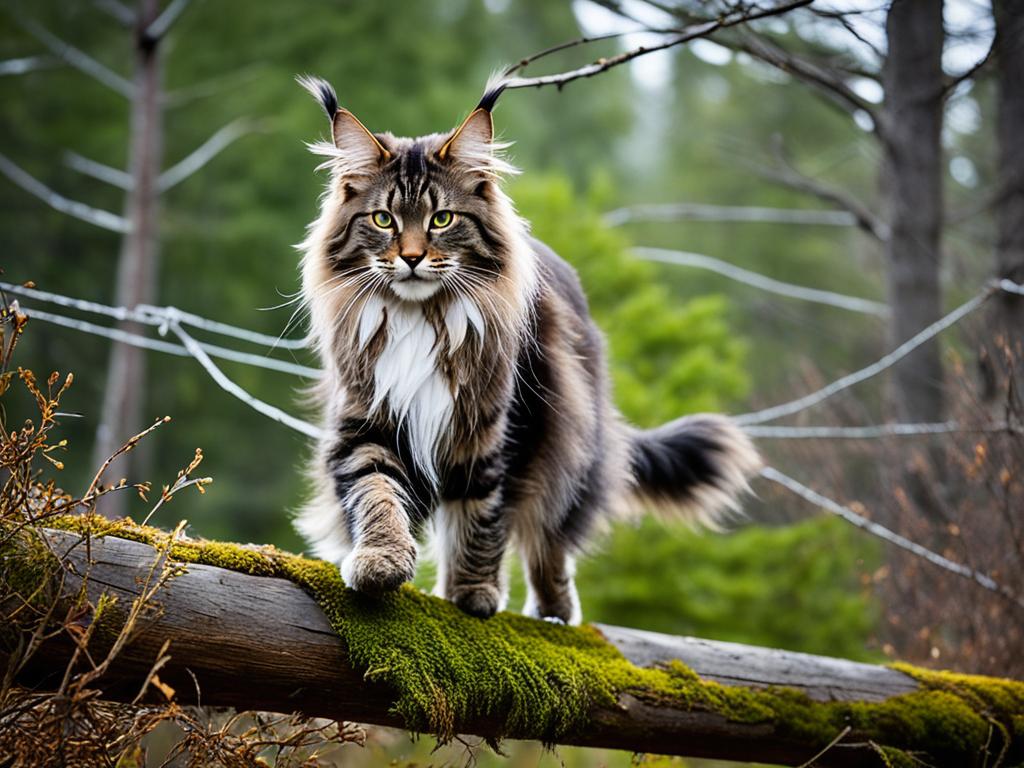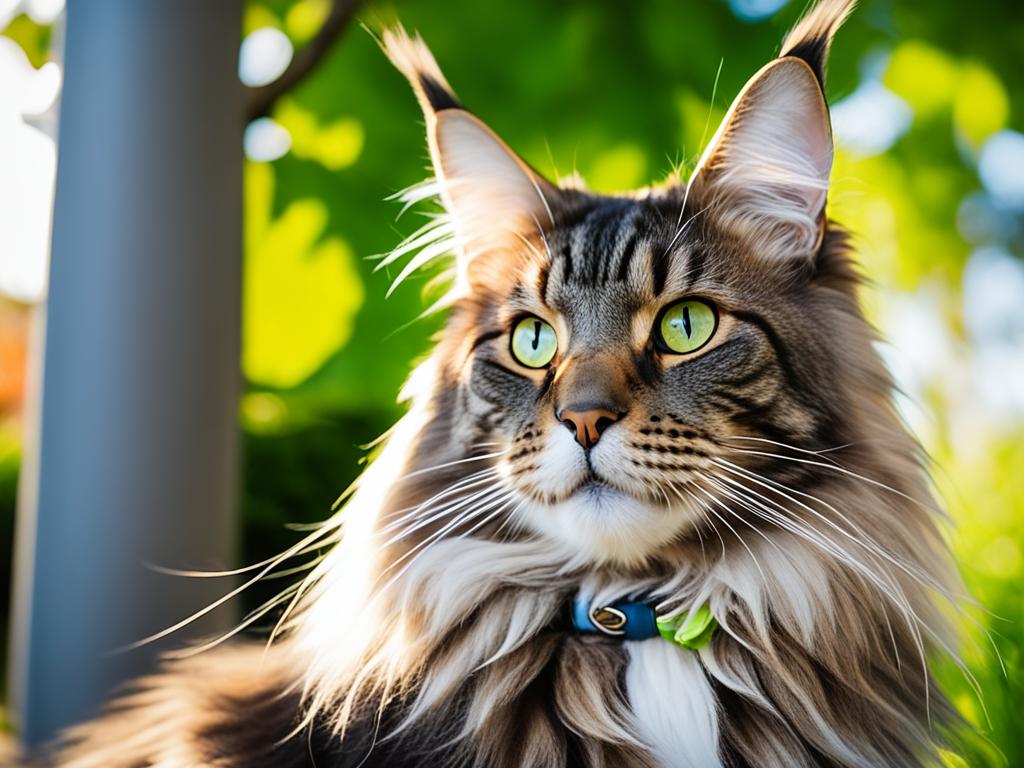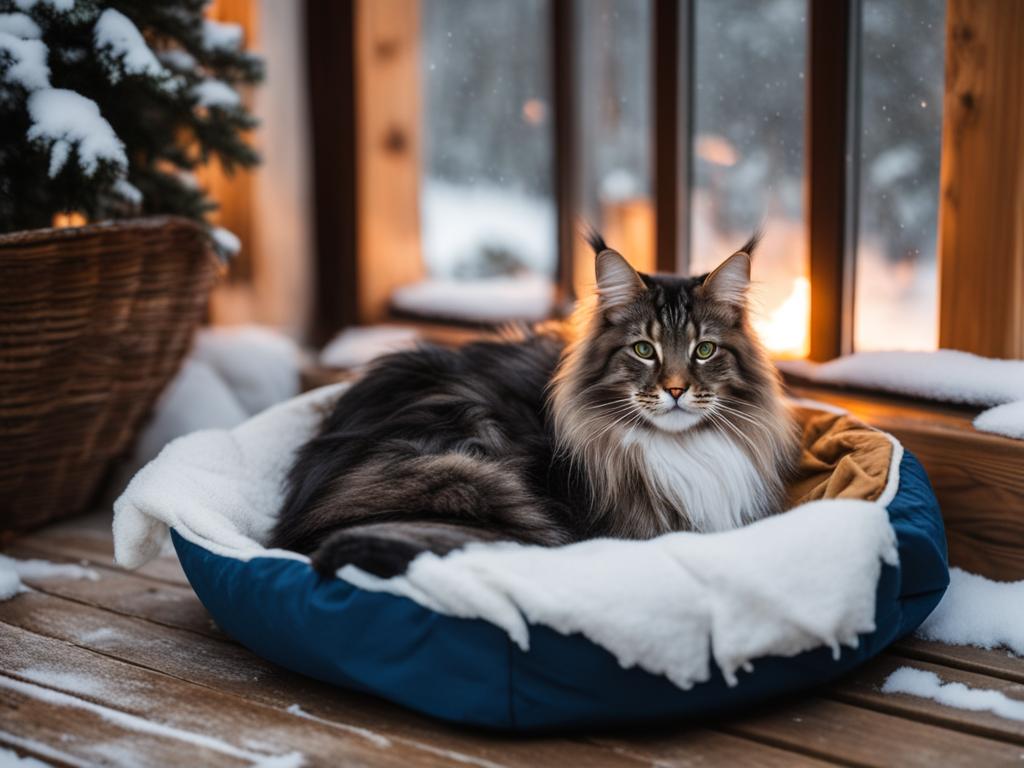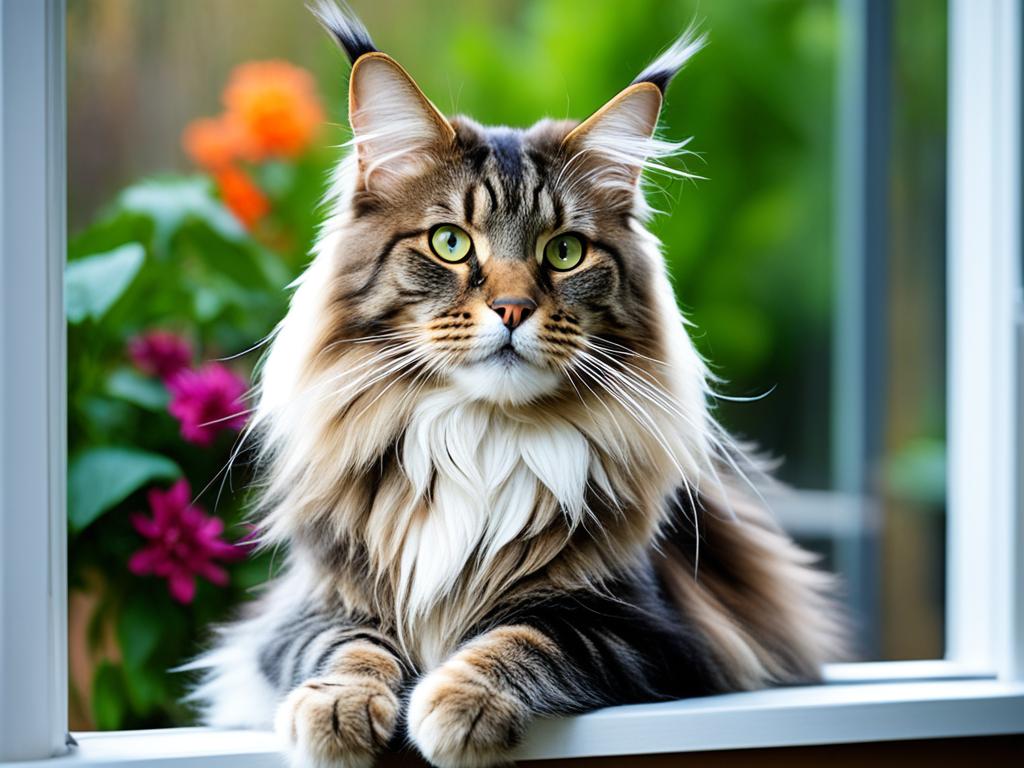Maine Coon cats are beloved for their affectionate nature and their love for the outdoors. However, it’s important to prioritize their safety before allowing them to roam freely. There are various hazards that Maine Coon cats may encounter outdoors, including predators, traffic, diseases, and extreme weather conditions. By taking the necessary precautions and following outdoor safety tips, you can create a safe and stimulating environment for your Maine Coon to enjoy outdoor adventures.
Key Takeaways:
- Outdoor safety for Maine Coon cats is crucial to protect them from potential hazards.
- Maine Coon cats may face risks such as predators, traffic accidents, and exposure to harmful toxins.
- Regular vet check-ups, proper vaccinations, and parasite prevention are essential for their well-being.
- Training your Maine Coon cat to go outside safely and supervising their outdoor activities can minimize the risks.
- Cold weather requires special care, including providing shelter and adjusting their diet accordingly.
Maine Coon Cat Characteristics
When it comes to Maine Coon cats, their characteristics are truly unique. From their impressive size to their friendly personalities, they have captured the hearts of cat lovers around the world.
Size
One of the defining features of Maine Coon cats is their size. Males can weigh up to a whopping 18 pounds, while females can reach up to 12 pounds. This makes them one of the largest domestic cat breeds. Their size is complemented by their long, muscular bodies and strong bones.
Appearance
Maine Coon cats have a distinct appearance that sets them apart from other breeds. Their most notable features include their large, expressive eyes and their tufted ears, which give them an adorable and attentive look. Another striking feature is their long, bushy tail that they elegantly carry around.
Personality
Maine Coon cats are renowned for their friendly and sociable personalities. They are known for their love of human company and often enjoy being around people. These cats are affectionate and thrive on being part of a family. They are also known to get along well with children and other pets, making them ideal companions.
Intelligence
Don’t let their adorable appearance fool you – Maine Coon cats are highly intelligent animals. They have an exceptional ability to learn and are often compared to dogs in terms of their trainability. Whether it’s mastering tricks or responding to commands, they are quick learners and can easily adapt to new situations.
Maine Coon Cat Characteristics:
| Size | Appearance | Personality | Intelligence |
|---|---|---|---|
| Males can weigh up to 18 pounds | Tufted ears and long, bushy tail | Friendly, sociable, and affectionate | Highly intelligent and trainable |
| Females can weigh up to 12 pounds | Distinctive large, expressive eyes | Gets along well with children and pets | Quick learners and adaptable |
Outdoor Dangers for Maine Coon Cats
When allowing your Maine Coon cat to explore the outdoors, it’s important to be aware of the potential dangers they may face. Understanding these hazards can help you take the necessary precautions to keep your furry friend safe. Here are some of the outdoor risks that Maine Coon cats may encounter:
- Traffic: Maine Coon cats are at risk of car accidents if they venture too close to roads or busy streets. It’s crucial to teach your cat to be cautious around vehicles and to supervise them closely when they are outside.
- Other Animals: Stray dogs, feral cats, and wild animals like raccoons or coyotes can pose a threat to Maine Coon cats. Encounters with these animals can lead to fights, injuries, or even transmission of diseases. It’s important to keep your cat away from potentially aggressive animals and to ensure they are up to date on their vaccinations.
- Poisonous Plants: Some plants found outdoors can be toxic to Maine Coon cats if ingested. Common examples include lilies, azaleas, and certain types of ferns. It’s important to familiarize yourself with the plants in your outdoor environment and keep your cat away from any potentially harmful vegetation.
- Parasites: Outdoor cats are more likely to come into contact with parasites such as fleas and ticks. These pests can cause discomfort, transmit diseases, and lead to complications if left untreated. Regular preventive treatments are essential to protect your Maine Coon cat from these parasites.
- Extreme Weather Conditions: Maine Coon cats may face risks associated with extreme weather conditions. Heat waves can lead to heatstroke or dehydration, while blizzards and cold temperatures can expose them to hypothermia. It’s crucial to provide adequate shelter, access to fresh water, and protection from inclement weather to keep your cat safe during extreme weather events.
Common Outdoor Dangers for Maine Coon Cats
| Danger | Description | Precautions |
|---|---|---|
| Traffic | Risk of car accidents if the cat ventures too close to roads or busy streets | Supervise closely when outdoors, teach caution around vehicles |
| Other Animals | Potential encounters with aggressive animals, leading to fights or transmission of diseases | Avoid areas with potentially aggressive animals, ensure vaccinations are up to date |
| Poisonous Plants | Certain outdoor plants can be toxic if ingested | Familiarize with harmful plants, keep away from vegetation |
| Parasites | Risk of fleas and ticks, leading to discomfort and potential diseases | Regular preventive treatments, check for parasites, keep environment clean |
| Extreme Weather Conditions | Risks associated with heat waves, blizzards, and cold temperatures | Provide adequate shelter, access to fresh water, protection from extreme weather |
It’s crucial to be proactive in protecting your Maine Coon cat from the various dangers they may encounter outdoors. By understanding and taking the necessary precautions, you can ensure their safety and allow them to enjoy their time outside while minimizing risks.

Training Your Maine Coon Cat to Go Outside
Before letting your Maine Coon cat go outside, it’s important to train them to do so safely. Here are some steps you can follow to ensure a smooth transition:
- Introduce a harness and leash: Begin by introducing your Maine Coon cat to a harness and leash indoors. Allow them to sniff and explore the equipment, gradually getting them used to wearing it. It’s essential to choose a harness specifically designed for cats to ensure their comfort and safety.
- Practice indoors: Once your cat is comfortable wearing the harness, practice walking them indoors. Use positive reinforcement and treats to encourage them to walk alongside you. Start with short sessions, gradually increasing the time as your cat becomes more confident.
- Supervise closely: When it’s time to take your Maine Coon cat outdoors, supervise them closely during their first few outings. This will allow you to monitor their behavior, ensure their safety, and intervene if necessary.
- Teach outdoor commands: Consider teaching your Maine Coon cat specific outdoor commands to enhance their safety and control. For example, teaching them to “come” or “stay” on command can be invaluable in preventing them from wandering into dangerous areas.
- Familiarize with the surroundings: As your cat spends more time outdoors, take the opportunity to familiarize them with their outdoor environment. Introduce them to different surfaces, sounds, and sights they may encounter, helping them become more comfortable and confident in their surroundings.
By taking the time to train your Maine Coon cat for outdoor adventures, you can ensure their safety while allowing them to enjoy the stimulating and enriching experience of exploring the great outdoors.

Supervising Your Maine Coon Cat Outside
While Maine Coon cats can enjoy spending time outside, it’s crucial to supervise them to ensure their safety. By following some key precautions and providing attentive care, you can keep your Maine Coon cat safe and protected in the outdoor environment.
Maintaining Identification
First and foremost, make sure your Maine Coon cat wears a collar with identification tags. In the unfortunate event that they wander off or get lost, this will significantly increase the chances of a safe return. Additionally, consider having your cat microchipped, as it provides a permanent form of identification that cannot be lost or removed.
Monitoring Their Whereabouts
When supervising your Maine Coon cat outside, always keep a close eye on their whereabouts. Be aware of their movements and ensure they stay within a designated area that you have deemed safe for them to roam. This helps prevent them from straying into potentially dangerous territory or encountering hazardous situations.
Providing Essential Resources
Keep your Maine Coon cat safe outside by providing them with access to shade and fresh water at all times. This helps protect them from excessive heat and dehydration, especially during warm weather. Furthermore, offering a comfortable outdoor space with cozy beds or cushions encourages them to stay within their designated area.
Awareness of Potential Hazards
Be mindful of potential hazards in the outdoor environment that could pose a risk to your Maine Coon cat’s safety. These may include toxic plants, dangerous chemicals, or sharp objects. Take proactive measures to eliminate or minimize these risks by ensuring your outdoor space is free from harmful substances or objects that could cause injury or illness.
Protection from Extreme Weather Conditions
Extreme weather conditions can pose a significant threat to your Maine Coon cat’s well-being. During hot summer days, provide shade and ensure they have access to cool, sheltered areas to avoid heatstroke or sunburn. In cold weather, consider providing additional warmth through insulated shelters or bringing them indoors, especially during harsh winter conditions.
| Supervision Tips for Maine Coon Cats Outside |
|---|
| Ensure your cat wears a collar with identification tags. |
| Keep a close eye on their whereabouts to prevent straying. |
| Provide access to shade and fresh water. |
| Be aware of potential hazards and eliminate them from the environment. |
| Protect them from extreme weather conditions such as heat or cold. |
How to Care for Outdoor Maine Coon Cats During Cold Weather
Cold weather requires special care for outdoor Maine Coon cats. Providing proper shelter is essential to protect them from the harsh elements of winter. Consider options such as insulated cat houses or granting them access to indoor spaces like garages or barns. These spaces can offer warmth and protection from the chilling temperatures.
Adding insulation like straw can help retain heat in their shelters, ensuring their comfort throughout the cold season.
Adjusting their diet is also crucial during winter. Cats require extra calories to maintain their body temperature, so consider providing them with food that is rich in nutrients and high in calories. Wet food can also contribute to hydration, as cats tend to drink less water in colder weather.
Regular health checks are essential for outdoor Maine Coon cats during the winter months. Visiting the veterinarian can help detect and prevent potential winter-related health issues.
To protect against hazards such as frostbite and exposure to toxic substances, it’s important to take specific precautions. Ensuring their shelter is dry and free from drafts, as well as providing ample bedding and blankets for added warmth, can help prevent frostbite. Additionally, be mindful of antifreeze and other chemicals that are commonly used during winter. Keep these substances securely stored and away from your cat’s reach.
Winter Care Checklist for Outdoor Maine Coon Cats:
- Provide a well-insulated shelter or access to indoor spaces like garages or barns.
- Add insulation like straw to retain heat in their shelter.
- Adjust their diet to provide extra calories and consider offering wet food for hydration.
- Schedule regular vet check-ups to detect and prevent winter-related health issues.
- Take precautions to protect them from hazards like frostbite and exposure to toxic substances.
By following these winter care tips, you can ensure the well-being and safety of your outdoor Maine Coon cats during the colder months.
| Winter Care Tips for Outdoor Maine Coon Cats | Best Practices |
|---|---|
| Provide shelter | Insulated cat houses or access to indoor spaces |
| Add insulation | Use straw to retain heat |
| Adjust diet | Offer high-calorie food and wet food for hydration |
| Schedule vet check-ups | Regular health checks to prevent issues |
| Protect from hazards | Prevent frostbite and exposure to toxic substances |

Steps to Take If Your Maine Coon Cat Runs Away
If your Maine Coon cat goes missing, it can be a distressing experience. However, there are several steps you can take to increase the chances of finding your beloved pet and reuniting with them.
The first thing to do is to conduct a thorough search in your neighborhood. Check hiding spots like bushes, under decks, or in garages. Make sure to call out your cat’s name and listen for any signs of response. It’s also helpful to provide a familiar scent by placing their litter box or a piece of their bedding outside.
Next, reach out to your local community for assistance. Contact animal shelters and veterinary clinics in your area to inform them about your missing Maine Coon cat. Share information and a clear photo of your cat on social media platforms, local community boards, and neighborhood groups. This will help spread the word quickly and increase the chances of someone spotting and recognizing your cat.
Utilize online resources specifically designed for lost and found pets. Websites and apps dedicated to reuniting owners with their missing pets provide a platform to post detailed information about your Maine Coon cat, including their physical appearance, any unique markings, and your contact information.
When your cat is found, it’s important to approach them calmly and avoid sudden movements or loud noises that might scare them away. Assess their health and check for any signs of injuries or distress. Provide them with food, water, and a comfortable space to rest and recover. Strengthening the bond with your cat through positive reinforcement and spending quality time together can help prevent future escapes and ensure their safety.
FAQ
What are some outdoor safety tips for Maine Coon cats?
Some outdoor safety tips for Maine Coon cats include training them to wear a harness and leash, supervising them closely when first going outside, and familiarizing them with their outdoor surroundings.
How can I keep my Maine Coon cat safe outdoors?
To keep your Maine Coon cat safe outdoors, make sure they wear a collar with identification tags and are microchipped. Supervise them closely, keep them within a designated area, and provide access to shade and fresh water.
What are the outdoor hazards for Maine Coon cats?
Outdoor hazards for Maine Coon cats include traffic accidents, encounters with other animals like stray dogs or wild animals, exposure to poisonous plants, and increased risk of diseases and parasites.
How do I train my Maine Coon cat to go outside?
Train your Maine Coon cat to go outside by introducing them to a harness and leash, gradually getting them used to wearing it. Supervise them closely when first going outside and teach them to come when called.
How can I supervise my Maine Coon cat outside?
When supervising your Maine Coon cat outside, keep a close eye on their whereabouts, ensure they stay within a designated area, and provide access to shade and fresh water. Be aware of potential hazards and protect them from extreme weather conditions.
How should I care for my outdoor Maine Coon cat during cold weather?
To care for your outdoor Maine Coon cat during cold weather, provide proper shelter such as insulated cat houses or access to indoor spaces. Add insulation like straw for warmth and adjust their diet to provide more calories. Regular health checks are essential, and precautions should be taken to protect against hazards like frostbite and toxic substances.
What should I do if my Maine Coon cat runs away?
If your Maine Coon cat runs away, conduct a thorough search in your neighborhood, alert your local community, and utilize online resources. When found, approach them calmly and assess their health. Reinforce positive behaviors and strengthen your bond to prevent future escapes.

Leave a Reply